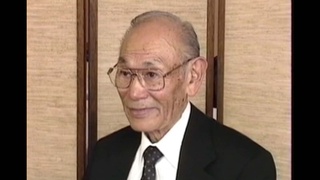Interviews
Avoiding the Japanese military
I*: And why did you return to the United States?
Well, that was before the Second World War. And my parents was worried that if I stayed in Japan, they might take me into their, you know, as the soldiers and go to the war. So, I had a citizenship [in] United States. So, if I come back in the United States, the Japanese government can’t, you know, can’t call me for the military. So that was the reason.
* "I" indicates an interviewer (Daniel Lee).
Date: February 4, 2004
Location: California, US
Interviewer: Daniel Lee
Contributed by: Watase Media Arts Center, Japanese American National Museum
Explore More Videos


Four sisters had international marriages (Japanese)
(b. 1937) A war bride from Yokohama

The reason to stay in Japan after his third year
Japanese American Creative designer living in Japan

Lack of political power led to camps
(1924-2018) Researcher, Activist

Choice to move east or go to Japan
(b.1920) Japanese Canadian Nisei. Established the Ikenobo Ikebana Society of Toronto


Institutionalization as a bad aspect of camp
(1924-2018) Researcher, Activist

State Department records show concern for treatment of Japanese American internees
(1924-2018) Researcher, Activist

Remembering December 7, 1941
(1923-2011) Lawyer, MIS veteran, founder of Francis and Sarah Sogi Foundation

Meeting Japanese Americans from the mainland in MIS
(1923-2011) Lawyer, MIS veteran, founder of Francis and Sarah Sogi Foundation

Awareness of concentration camps as a Japanese American
(1923-2011) Lawyer, MIS veteran, founder of Francis and Sarah Sogi Foundation

Manhunt
(1919 - 2005) Challenged the constitutionality of Executive Order 9066.

The Final Verdict
(1919 - 2005) Challenged the constitutionality of Executive Order 9066.


Search of family home by the FBI following the bombing of Pearl Harbor
(1937 - 2021) Teacher
